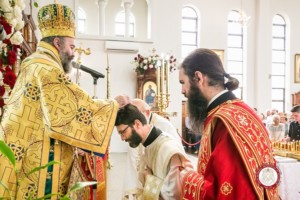Ordination

During His ministry Jesus appointed the twelve Apostles to continue his work. As eye witnesses of the Death and Resurrection of Christ they became confessors of the Truth of the Gospel. The Apostles were sent to proclaim the Gospel through preaching, teaching, bearing witness to the Kingdom of God, and through miracles in the Holy Spirit. “And as you go, preach, saying, ‘The kingdom of heaven is at hand.’ Heal the sick, cleanse the lepers, raise the dead, cast out demons. Freely you have received, freely give” (Mt 10:7-8).
The Apostles were not just conveying Christ’s teachings and preserving the purity of the faith, but also, through the sacramental nature of the Holy Spirit, they were given authority to administer the Eucharist, administer membership into the Church through Baptism, as well as oversee the other Sacraments of the Church. As church membership increased the needs of the laity had to be met. The Apostles in turn ordained their successors through the Sacrament of Ordination, or the ‘laying on of hands.’ This Apostolic Succession, as it is known, guarantees the continuity and unity of the Church from the time of Christ to this present age, and to the age to come. All candidates for ordination are men who have been chosen from within the Church for service to the Church. These candidates must possess spiritual gifts of leadership, and lead by example to help strengthen the Church.
Through the laying on of hands, the Holy Spirit descends upon the candidate for Holy Ordination, sanctifying him and empowering him to be a shepherd and minister of Christ, to preach and to teach the Word of God, to administer the sacraments, and to guide God’s people towards salvation.
The Apostle Paul exhorts Timothy, “Let no one despise you for your youth, but set the believers an example in speech, in conduct, in love, in faith, in purity. Until I come, devote yourself to the public reading of Scripture, to exhortation, to teaching. Do not neglect the gift you have, which was given you by prophecy when the council of elders laid their hands on you. Practice these things, immerse yourself in them, so that all may see your progress. Keep a close watch on yourself and on the teaching. Persist in this, for by so doing you will save both yourself and your hearers” (1 Tim 4:12-16).
The Holy Spirit acts in this Apostolic Succession to ensure the spreading of the Word throughout the world: “Jesus said to them again, ‘Peace be with you. As the Father has sent me, even so I send you,’ and when he said this, he breathed upon them and said to them, ‘Receive the Holy Spirit. If you forgive the sins of any, they are forgiven them; if you retain the sins of any, they are retained’ ” (Jn 20:21-23).
Following the custom of the Apostolic Church, there are three major orders, each of which requires a special ordination. These are Bishop, who is viewed as a successor of the Apostles, Priest and Deacon, who act in the name of the Bishop.
The Greek word for Bishop (episkopos) means “overseer.” The Holy Orders are a calling to “oversee” the teaching and sacramental presence of Christ in the Church. The Bishop is seen as the father of the Local Church – the Shepherd who manifests the place of Christ in the Church. Only a Bishop may ordain and this is done during the Divine Liturgy, with the congregation proclaiming Axios! (He is worthy!) Even a Bishop must be ordained with the assent and laying of hands of at least two other Bishops. Since the sixth century Bishops have been chosen from the celibate clergy. No Bishop is considered infallible or superior to other Bishops but rather they are servants of Christ and the Church.
The Priests of the Church, also known as presbyters, assist the Bishop in his work and Pastor the local church. They teach, preach, counsel and perform the Sacraments of the Church. The Orthodox church permits men to marry before they are ordained.
The Deacons serve both the Priests and Bishops in assisting with liturgical functions as well as philanthropic ministry. The Deacon cannot preside over the Eucharist in the absence of the Bishop or Priest. In the Acts of the Apostles we have a record of the appointment of the first seven Deacons in the Church.
The fact that every Orthodox Priest, Bishop, and Deacon in the present day can trace back their Priesthood to the Apostles through Apostolic Succession, is a great testimony to the one and undivided Church of Christ that has always existed since apostolic times, and that is truly, “One, Holy, Catholic and Apostolic Church.”
Source: Lychnos June-July 2020 edition
